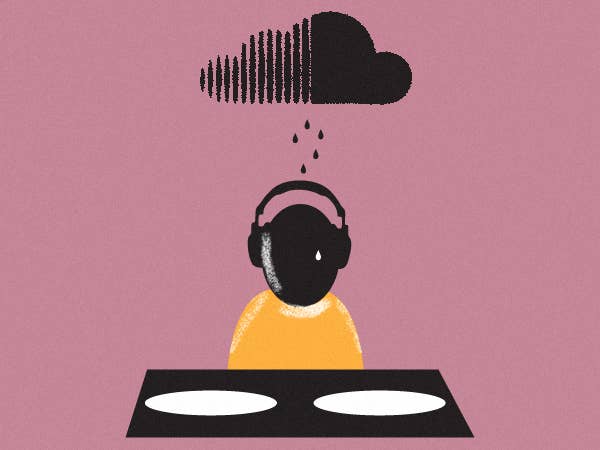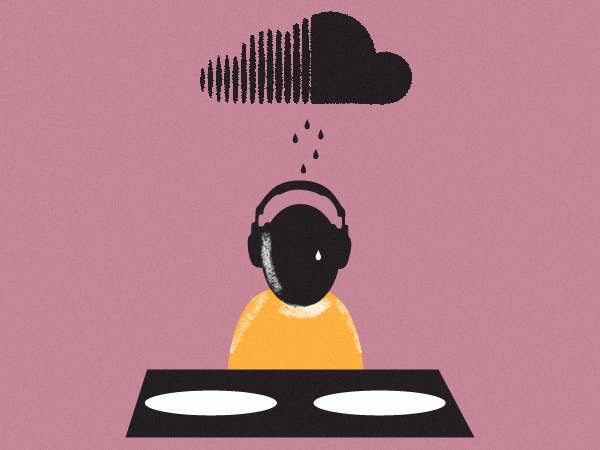1.

Image via @suedejury
Last August, a DJ/producer named ESSNTL was victimized by the SoundCloud Purge. The anarchic yet popular music streaming platform was taking steps toward launching a paid subscription model, and accounts had begun to disappear.
Users like ESSNTL, who’d built small yet devoted followings based on a steady diet of dance-related content—some originals, but mostly remixes, mashups and full DJ mixes—quickly accumulated the “three strikes” of copyright infringement necessary to get their profiles banned with no hope of appeal.
For services like SoundCloud, ones who tacitly allowed illegal content in order to grow their communities, all roads to going legit are paved with dead accounts.
ESSNTL, who began building a profile in December 2012, wasn’t exactly surprised to get bounced. “They were pretty clear on what had violated the terms,” he says. “I guess that’s the whole thrill with being a DJ and sharing other artists’ work. But the one thing that I didn’t and still don’t understand is why you can search Kanye’s name and all these accounts come up with his copyrighted material and thousands of plays.”
SoundCloud has had a long, contentious history with record labels. The platform’s roundabout path to competing with Spotify and Apple Music began as a minimalist, no-cost way to host audio files. It was embraced by the music blogosphere who, for years, had battled labels over the legality of posting free, self-hosted MP3 downloads.
By replacing MP3s with streams hosted on SoundCloud, independent blogs inoculated themselves against copyright violations. But without offering a product to download and own, they no longer provided a compelling outlet for users, who increasingly went directly to SoundCloud for music discovery.
With no option to monetize, it was another revenue stream the recording industry had lost to innovative technology—a story labels have experienced repeatedly since Napster launched in June of 1999.
Part of SoundCloud’s authenticity was that, whether it intended to or not, it didn’t play ball with labels at first. It valued an open platform based around community rather than providing yet another marketing platform for established companies. That’s not to say it excluded major label artists: anyone could upload whatever they wanted, as long as it was free and open to all. With no preferential treatment, users were empowered to decide what was popular.
Part of SoundCloud’s authenticity was that, whether it intended to or not, it didn’t play ball with labels at first.
This changed as labels began to issue copyright notices on streaming tracks and mixes rather than music blogs. SoundCloud’s disorganized structure made it nearly impossible to monitor legality, so, like YouTube before it, the platform built a content ID system which used audio fingerprinting to automatically flag and take down music owned by a creator not associated with the account where it was uploaded.
In 2014, the platform did the digital equivalent of kneeling on one knee by giving Universal Music Group backdoor access to its data. Now, the major label could flag both individual streams and accounts for deletion without oversight.
DJ V-Boi, who signed up in 2010, grew his SoundCloud account in parallel with the company. “To begin with, I just used it to listen to new music,” he said. “Then as I evolved as a DJ, I started to listen to other DJ mixes and upload my own. I received some great feedback and started to build a fanbase, which spurred me to create more mixes and upload them to SoundCloud. Around 2014, I began to upload my own productions before I started to get strikes and emails about copyright.”
For V-Boi and countless other DJs without label backing, the road to 1500 fans was a grind. Days spent creating fresh content and interacting with commenters were ultimately wasted. V-Boi knew his mixes used material owned by others, but what left him so despondent about having his account deleted was the platform’s promise that users could appeal strikes they felt were unwarranted.
Violation emails didn’t make it clear that a third strike would result in permanent deletion of his account along with its data. “My followers, likes, plays, comments, people I followed, they were all wiped.”
Accounts with larger followings—such as one belonging to EDM producer Morgan Page or the music magazine Dummy, who ran afoul of Sony during the August 2015 purge—were able to have their sins absolved by removing the offending content and apologizing.
Artists without institutional backing, those without label reps with backdoor access and special in-house contacts ready to clear up disputes, had no recourse. Check the subreddit for mashups last fall. It’s a total bloodbath.
Artists without institutional backing, those without label reps with backdoor access and special in-house contacts ready to clear up disputes, had no recourse.
Disappearing profiles impacted the world of online radio, too. Stations such as NTS and Berlin Community Radio, who had built followings for archives of their shows on SoundCloud, also had accounts deleted. “We spent two years really actively building up a very strong and dedicated community—exactly the kind of community which in turn helped increase SoundCloud’s following, traffic and number of users,” Sarah Miles, co-founder and director of Berlin Community Radio, told me. “To then have it completely wiped out, never to be accessed again, was devastating.”
Search for those and newer stations such as The Lot, and you’ll find that they’ve migrated over to Mixcloud, a service which explicitly caters to long runtimes and mixes which contain multiple artists. “We’re just happy that the published artists are getting paid properly by Mixcloud,” said Sean McAuliffe, managing director at NTS Radio. “Whether the major record labels are distributing these payments fairly to the artists is still the serious question people should be asking and solving.”
“Mixcloud has worked hard for a number of years to build a great platform with DJs, radio stations and curators at the heart of the community,” said co-founder Nikhil Shah. “We’ve always had a sharp focus on this community, so we built a product and company with their needs in mind.”
We’re just happy that the published artists are getting paid properly by Mixcloud. Whether the major record labels are distributing these payments fairly to the artists is still the serious question people should be asking and solving.—Sean McAuliffe, NTS Radio
I asked Brooklyn artist Dubbel Dutch, a SoundCloud user who avoided deletion but still migrated away from the platform, what he felt about its evolution from artist enabler to label partner.
He voiced the inevitability many companies face when stuck between a community and a business. “People in my circles are using it less, but I think this has much more to do with oversaturation of the platform and irritating design changes to the site itself than concerns over copyrights,” he wrote. “I think, if anything, the partnerships with major labels could possibly lead to some long term benefits for artists and big labels. Major labels are eventually going to wake up and see that unofficial remixes can translate to performance royalties for their artists. There’s nothing stopping the original artist from monetizing these tracks and turning it into passive revenue.”
That’s exactly what SoundCloud Go, the platform’s recently launched subscription service, offers to content creators. Music owners now have the option to either collect royalty and advertising revenue or issue a DMCA takedown notice. That there’s an option at all shows an industry progressing toward the realization that DJ mixes and edits have value, official or not.
“There’s little negative impact on the original artist themselves, and labels don’t have to spend any capital whatsoever,” continued Dubbel Dutch. “It’s just money sitting around waiting to be collected by them. This seems like the most logical compromise.”
But for those with deleted accounts, the question becomes how to start over: on SoundCloud, playing it straight in fear that yet another account could get wiped, or elsewhere, on platforms like Mixcloud or private servers without social components.
“I didn’t make anything for a few weeks,” said ESSNTL, detailing how he reacted to his account being deleted. “I blamed SoundCloud for it all, then I took a step back and had to look at myself. I made the mistake of not creating my own structure for my art and just made SoundCloud my primary means of sharing my content. I used that knowledge and just started building my own kind of platform.
“All in all, SoundCloud is great. It gives us content creators a way to share music/mixes in a way that we never have been able to before. [But] I feel that it has changed as far as being for the artist, to almost being against artists in a way because of all the backlash from the record labels. I fully understand now what its responsibilities are as a music company, and with growth comes change.”
Streaming services are not immune to the laws of nature. Change and growth come with a cost. For most users, it’s $9.99 every thirty days.
For others, it’s years of work sucked into the digital ether, the evidence of their successes, whether in building communities or pulling off the sickest of transitions, surrendered to the gods of copyright and capital.

